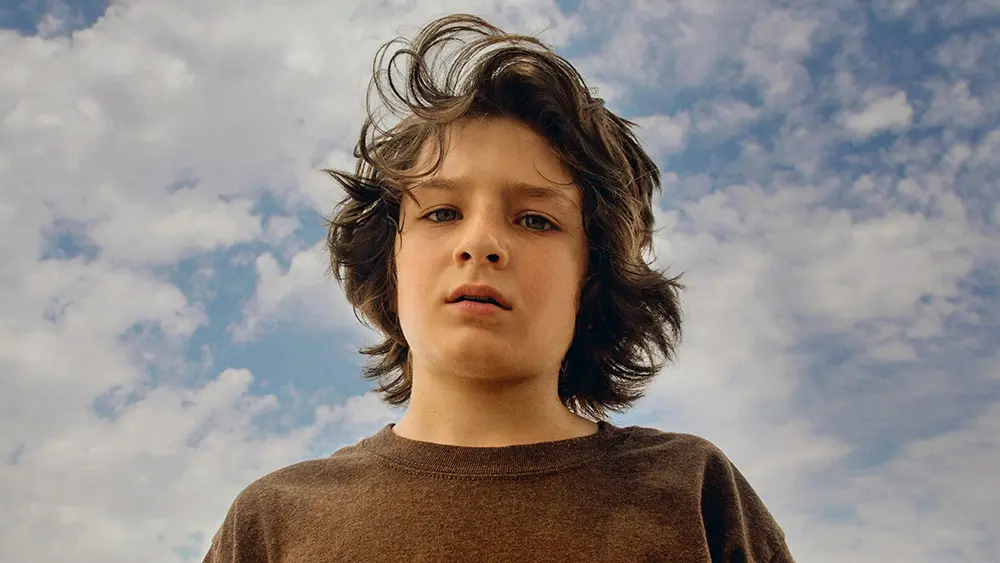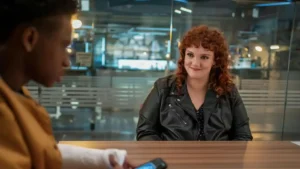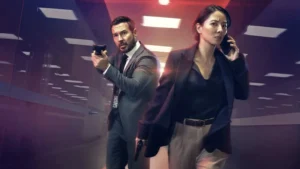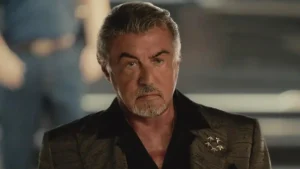Summary
Mid90s is a joyous, heart-hugging film capable of exploring a spectrum of boyhood emotions by opening a keyhole through time.
In Mid90s, Stevie (Sunny Celjic) is the youngest son to Dabney (Katherine Waterston) and little brother to Ian (Lucas Hedges), who form a slightly destructive suburban family unit in LA. Stevie meets a group of skaters at Motor Avenue skate shop and begins to figure out who he is by getting lost in the world of Skate or Die.
This is a postcard of a film. A snapshot of particularity that isn’t a prosaic study or filmic epic, but a freezeframe of boyhood that skates, falls and skates again in the organically breathable microsmic zeitgeist of the mid-nineties.
I’d say that Sunny Celjic is a revelation but I’ve played God of War. The young teen has a celestial range of emotion. In the game which sees Sunny as Atreus, a constant companion to his godly father Kratos, an eighty-hour epic of bonding and battling is the pin hammered by Thor’s hammer Mjolnir in that it is the impregnable bolster that secures vast components of gameplay with a vividly-told narrative. From eighty hours to eighty minutes – everything about Mid90s is lithe yet lived-in – Celjic has acted like Loki in stealing that pin and assimilating it. His performance here, whether nervously unsure how to answer the questions of those he looks up to, giddy at having “two fingers in her vagina” – this is written and directed by Jonah Hill don’t forget – or fearful of his older brother Ian, is as metered as it is magnetic.
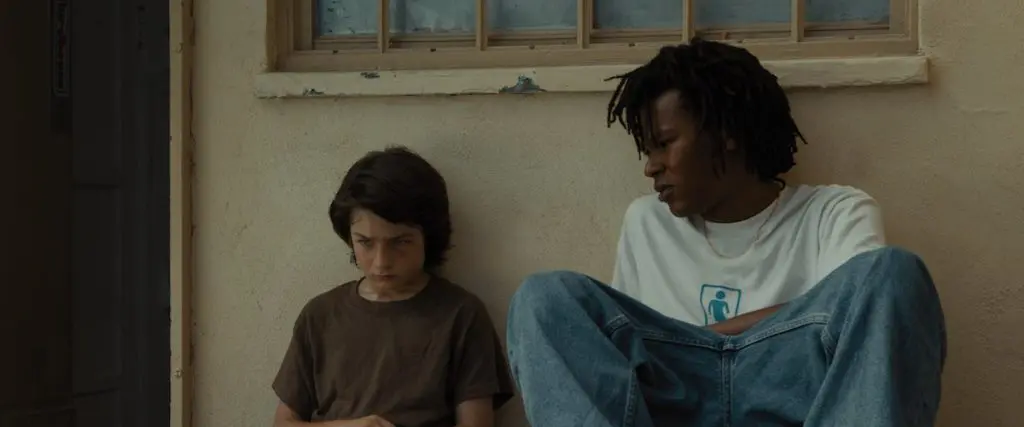
The crew that Stevie gets in with is equally as mesmerizing. Na-Kel Smith is Ray, the prodigal skater with the sharpest mind, Olan Prenatt is Fuckshit, Ray’s lifetime best bud but with more of a penchant for partying and booze, Ryder McLaughlin is Fourth Grade, the quiet cameraman that shoots Ray and Fuckshit’s sublime skating and then Gio Galicia is Ruben, the young errand boy until Stevie rocks up with his neon dinosaur board from the ’80s. As a crew, they’re tight yet fractured and as friends, they’re continually insulting one another until they’re cheering them to hit a rooftop gap or applauding the subsequent bloody bail. There’s caustic camaraderie that the viewer is invited to be a part of. I checked my knees for scabs on the way home.
And back to Jonah Hill. The actor has truly carved a career of his own, from a bit part buying goldfish boots in The 40-Year-Old Virgin to making all of our cheeks hurt from his lead turn as Seth in Superbad to getting Oscar nominations for his supporting roles in Moneyball and The Wolf of Wall Street, Hill has been pursuing a passion. And Mid90s certainly is a passion project. This is a picture painted by personality. It has Hill’s usual vulgar humor (which I’ve always adored for its reality to how young people actually speak) but it also has heart and soul and honesty. The soundtrack is songs that sculpted Hill’s own young years. The cast are immediately humane, perhaps pointed refractions of many a different personality that Hill grew up with.
Jonah Hill’s truest strength for the cinematic lie in the conversations. Whilst there are some nice visual motifs: the troupe skating down a hill, carving on concrete amidst uniform traffic, and a clever edit in which the motion of a party is caught in moving snapshots, like a flip-book scenario, it’s the dialogue that offers the authenticity this film exudes. If only we could all sit down together, our differences leading the conversation of questions, without any political (or politically correct) agenda, but simply answers to lingering questions formed from being in our own racial lane. This scene takes place early on in the skate shop. ‘Do black people get sunburn?’ is one such question. And, to much laughter and ridicule, Fourth Grade still gets his answer. And Stevie gets his nickname.
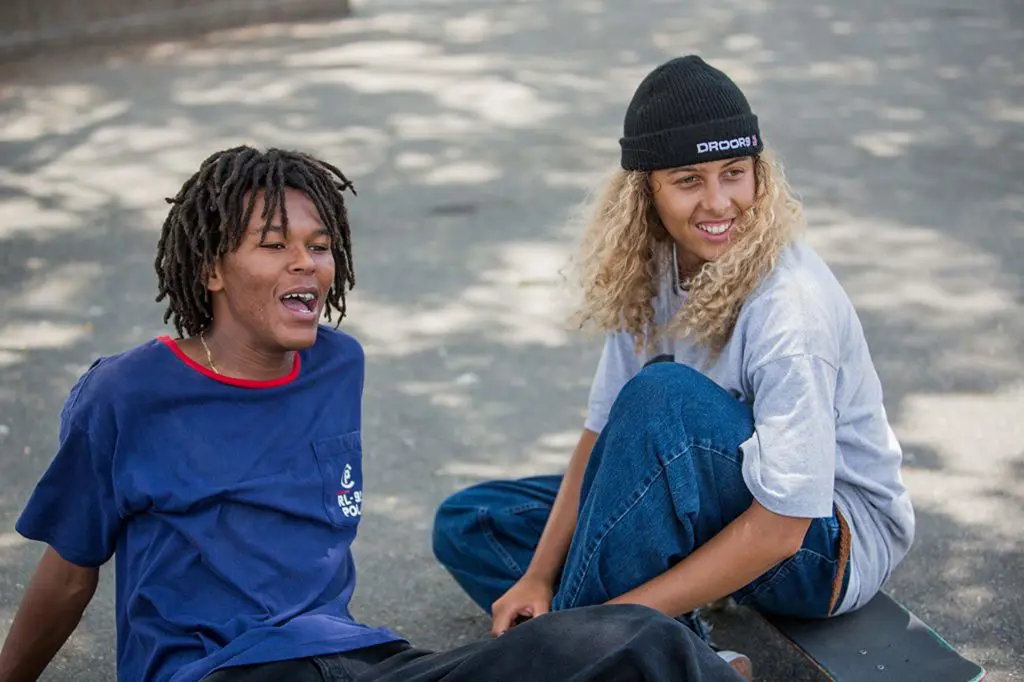
Though the coming-of-age themes are potent not all of the film’s pieces are complete. Especially the family drama, which is most often integral to films exploring the purgatorial space of living between childhood and adulthood. Katherine Waterston and Lucas Hedges, the two biggest actors in the film, are often underused and slightly underdeveloped. Their storylines of struggling-with-identity young Mum and cocksure-wannabee big brother don’t quite feel complete. And though each have tender moments with Stevie, there is potential for a lot more to be wrung from these volatile relationships.
Where Captain Marvel tried to force us to live in the ’90s with NIN t-shirts, Hill has Trent Reznor and Atticus Ross score scenes of poster changes, the first kiss, drink and drugs, but more fittingly, the first time nailing an ollie. This soundscape is ethereal and yet grounding, like Reznor and Ross’ score to Before The Flood. My writing playlists grow with every Reznor and Ross record. The soundtrack then also carries a load of bottling the 90’s vibe and aesthetic with a heavy Hip-Hop mix but there’s still space for some Nirvana and Seal.
Mid90s doesn’t just try to report on a time through a corporate sense of nostalgia but offer a keyhole into it, one where you can smell the weed, feel the hits, grin at the pop culture that shaped you and bob to the music. Jonah Hill has shown a keen ear for believable conversation between disenfranchised youths who are apoplectic and apathetic at once. He has left something of himself here that lingers, and that’s perhaps why I adored this film that took me back to being a poor teen looking to skating and rebelling as a sense of self. Like the skater and grunge movement than forewarned the directionless and dissonant Jackass generation which I’m proudly part of, Mid90s is an unabashedly pure picture about the impurity of persona. A joyous, heart-hugging film capable of exploring a spectrum of boyhood emotions through our velocity to be liked, our vitriol at attracting reactions and our outward vulgarity in telling our own story. I think I might dust off my deck.
More Stories

